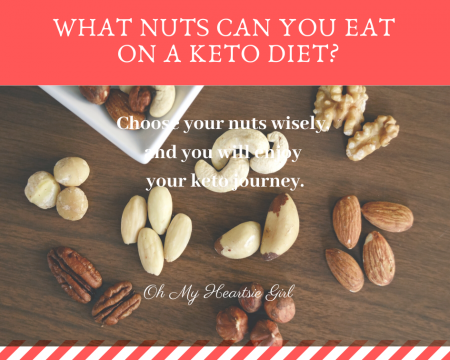 A ketogenic diet is low carb, and getting started is not easy. But, with the inclusion of snacks such as nuts, the whole journey becomes simpler. You can feel better when hungry between meals and craving for foods such as pasta, bread, rice, and potatoes. Besides, the diet eliminates all sugary foods, and therefore even desserts are out of reach. Here are some of the nuts allowed on in a keto diet.
A ketogenic diet is low carb, and getting started is not easy. But, with the inclusion of snacks such as nuts, the whole journey becomes simpler. You can feel better when hungry between meals and craving for foods such as pasta, bread, rice, and potatoes. Besides, the diet eliminates all sugary foods, and therefore even desserts are out of reach. Here are some of the nuts allowed on in a keto diet.
Macadamia nuts
Macadamia nuts are some of the satiating nuts you eat while on a keto diet. They have about two grams of carbs and 21 grams of fat per ounce. The fat content of the nuts is 75% and they help lower cholesterol levels and insulin resistance in the body while keeping off belly fat and cardiovascular diseases.
Since the nuts are rich in selenium, magnesium, and potassium, they help quicken weight loss and help manage hypertension, which lowers the risk of stroke. You can find these nuts in peanut butter or as eat them as snacks.
Pecans
Pecans are rich in oleic acid, and their fat content is 70%. A single serving of pecans has a gram of starch, protein is 3 grams and fat is 20 grams. The presence of oleic acid helps lower cardiovascular disease risk and also diabetes type 2. What’s more, the nuts enhance immunity in the body while lowering inflammation.
Brazil nuts
Brazil nuts are beneficial to the body, with only a single gram of carbs per serving. They are rich in fats at 18 grams and proteins at 4 grams in every serving. They help to lower triglycerides and cholesterol. They are large and in a keto diet, you eat about eight of them in every ounce serving. The selenium in the nuts is great for cognitive function, especially in older people as it overcomes oxidative stress.
Walnuts
Walnuts have polyunsaturated fat weighing 18.3 grams, proteins 4.3 grams and carbs 1.9 grams. The healthy fat in these nuts is similar to what you get in avocado and sunflower seeds and they help prevent cardiovascular diseases and improve testosterone levels in men. Besides, those following a ketogenic diet lower weight, lower cancer risks and prevent damage of the cell by eating these nuts.
Hazelnuts
Hazelnuts make a healthy snack and keep you full between meals in keto. Studies revealed that these nuts could lower bad cholesterol in the body and do not interfere with the levels of good cholesterol in the body.
Nuts to Eat in Moderating During Keto
The above five nuts have very low carbs. But these ones should be eaten in moderation because they have more carbs and can throw you out of ketosis if you overindulge.
Pine Nuts
Pine nuts are tasty and may look harmless. But their carb content is 3 grams, protein is 4 grams, and starch is 19 grams. If you overeat of these nuts, you could end up with over 30% carbs in your meals throughout the day.
Almonds
Almonds’ fat content is 14 grams; carbs content is 6 grams, and protein 5 grams. Baking flour used for keto diet is made from almond. It is a staple that you should not overeat as it can increase your carbs per day and affect your ketosis. However, almonds have many health benefits, including enhanced metabolism and lower cholesterol in the body.
Cashews
Cashews are ideal when consumed as nut butter. They have 12 grams of fat, which is not much compared to most keto nuts. They also have a high content of carbs, 8 grams, making it extremely important to be careful with the nuts. They can make an ideal day time snack to keep you full and minimize the risks of eating non-keto foods.
Pistachios
Pistachios have more proteins than any other keto nut. The protein content in the nuts is 6 grams, 4.6 grams of carbs, and 13 grams of fat per serving. According to studies, these nuts can help lower bad cholesterol and enhance the cardiovascular system’s health. One interesting thing about pistachios is that they come in shells, which can easily discourage you eat a lot of them and it helps in portion control.
A ketogenic diet is low carb, and getting started is not easy. But, with the inclusion of snacks such as nuts, the whole journey becomes simpler. You can feel better when hungry between meals and craving for foods such as pasta, bread, rice, and potatoes. Besides, the diet eliminates all sugary foods, and therefore even desserts are out of reach. Here are some of the nuts allowed on in a keto diet
How to Eat Keto Nuts
Nuts can be eaten as a snack or an ingredient in your recipe. Here are rules to help you enjoy eating nuts while getting maximum benefits.
Avoid Any Nuts with Suspect Ingredients
When buying nuts, always read the package and stay away from nuts with added flavors, sugars, and some oils, including canola, sunflower, soybean, veggie and peanut oils. The ingredient lists are always clear and make the nuts rich in carbs. The best nut butter should be made of nuts, olive oil and salt, and nut flour should not have extra ingredients apart from the nuts.
Watch Your Portions All the Time
Nuts are tasty, and it is easy to eat large portions in one sitting. You need to measure the amount you eat all the time. A measuring cup comes in handy. You can take too many carbs thinking you are safe because the nuts carb content is below 5 grams, but they can quickly elevate your ideal carb allotment in a day.
Have a Variety
Apart from having several types of nuts to snack on, you should have other foods, including fruits, meats, and vegetables in variety. This not only ensures you get enough nutrients but always helps you avoid overeating nuts. Topping smoothies or salads with nuts make your food interesting. Nuts are a great way to spice your boring low-carb diet, but always remember moderation is essential.
Check for sensitivities
Nuts contain some ingredients which can affect your digestive system. One of the ingredients to avoid in nuts is phytic acids. It is found naturally in most nuts and if you get bloated after any nuts, you should avoid them all. What’s more, phytic acid can also affect the absorption of zinc, iron, and magnesium in the body.
The Bottom Line
Choose your nuts wisely, and you will enjoy your keto journey. Check out our keto fruit list to help you supplement these nuts effectively. They are delicious and can brighten your day and help curb your cravings for carb-rich foods.
[…]
Keto Articles of interest:
Can I Eat Salsa On Keto?
Restricting Intake Of Calories Using a Keto Diet
What Nuts Can You Eat on a Keto Diet?
This post may contain automatically and manually added affiliate links, which means I might receive a small commission if you make a purchase using a link at no extra cost to you.




 The keto diet might just be the most popular idea in the unconventional health and fitness world right now. More than ever before, a wider audience is considering low-carb diets, especially the keto diet. Why? Because it has proven to be
The keto diet might just be the most popular idea in the unconventional health and fitness world right now. More than ever before, a wider audience is considering low-carb diets, especially the keto diet. Why? Because it has proven to be 
